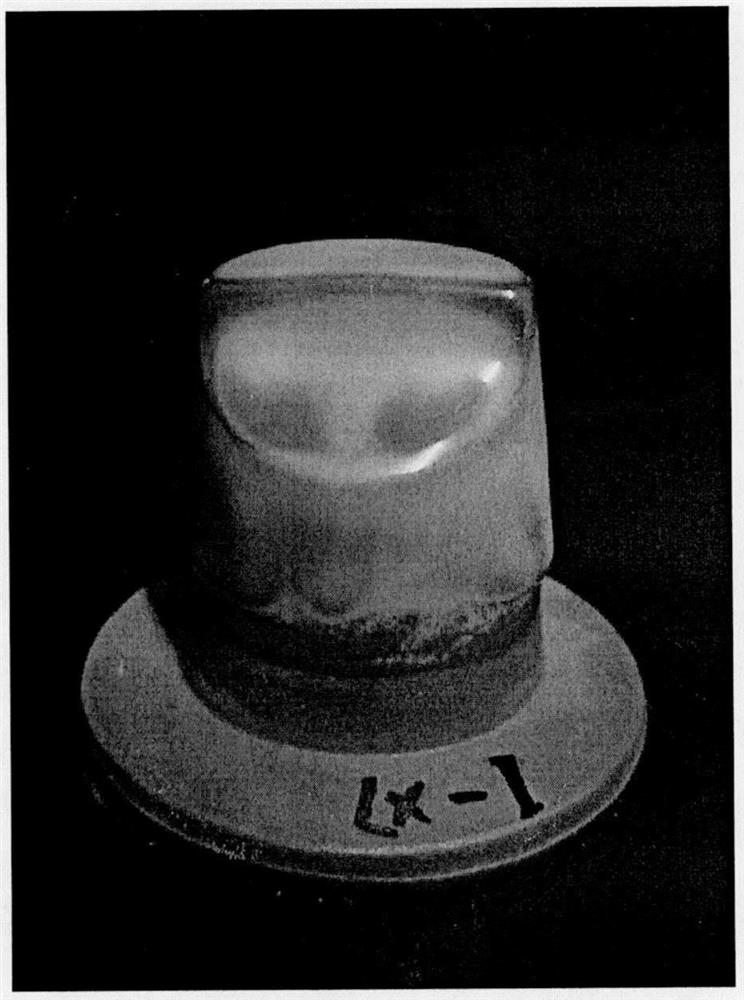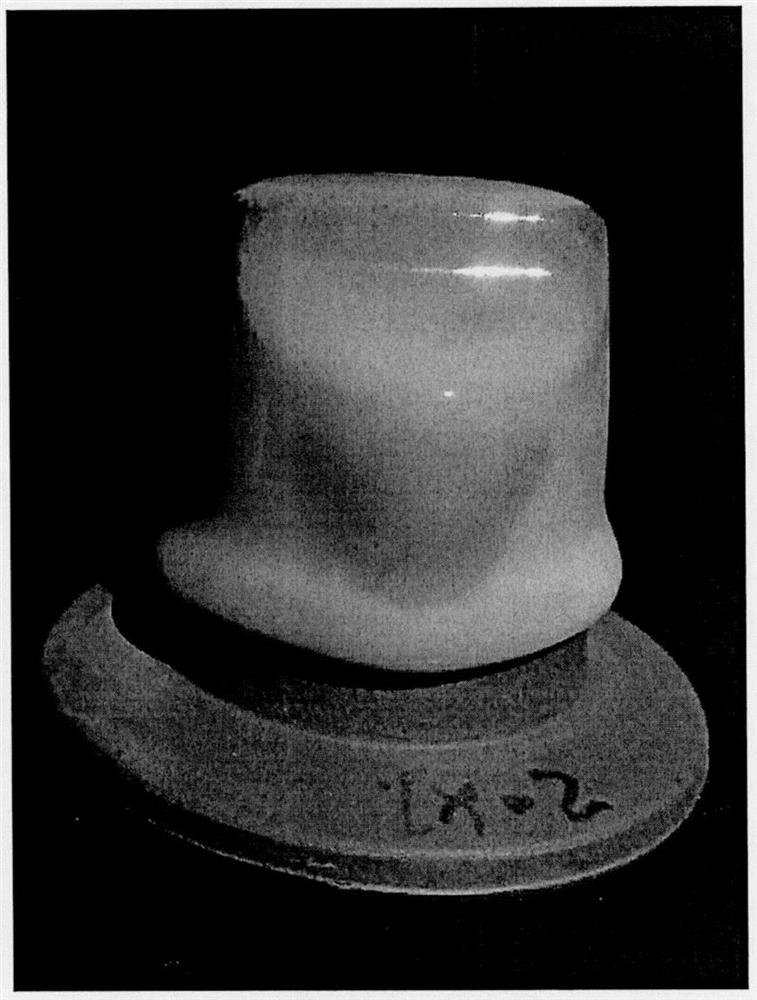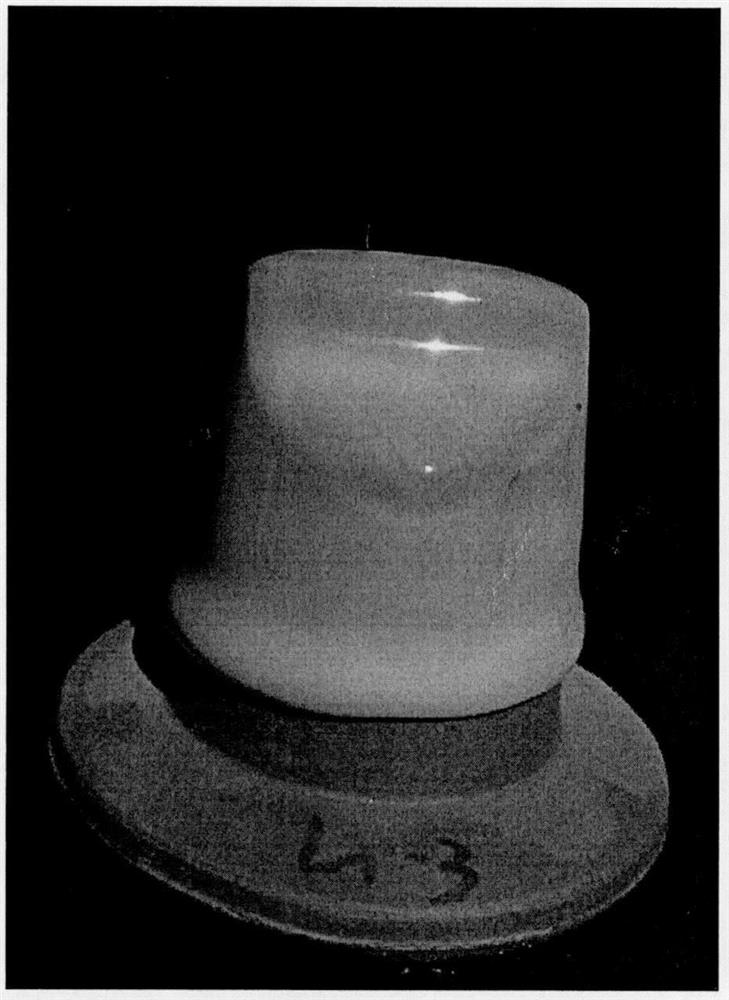A firing method with controllable variable effect of Jun porcelain kiln
A technology of kiln transformation and Jun porcelain, which is applied in the firing field of controllable Jun porcelain kiln transformation effect, and can solve problems such as difficult control and Jun porcelain difficulty
- Summary
- Abstract
- Description
- Claims
- Application Information
AI Technical Summary
Problems solved by technology
Method used
Image
Examples
Embodiment 1
[0022] 1. Glaze embryo selection: use the moon white glaze as the carrier, dry the glaze embryos with the moon white glaze applied to the kiln.
[0023] 2. Selection and processing of kiln glaze: 500g of copper oxide, 300g of calcite, 150g of zinc oxide, 30g of burnt talc, and 20g of tin oxide are mixed and put into a 1kg ball mill jar, and then processed with 800g of water for 30 hours to obtain a particle size of 250 mesh. Glaze, and placed in a crucible to dry.
[0024] 3. Place the crucible containing the dried kiln-transformed glaze and the Jun porcelain glaze blank that needs to have a kiln-transformed effect horizontally.
[0025] 4. Firing method: In the first step, fire in a weak oxidizing atmosphere for 3 hours to 950°C; in the second step, fire in a reducing atmosphere for 2 hours to 1080°C; in the third step, fire in a reducing atmosphere for 4 hours to 1180°C ℃; the fourth step, firing in a weakly oxidizing atmosphere for 2 hours to 1280°C; the fifth step, coolin...
Embodiment 2
[0027] 1. Glaze embryo selection: use the sky blue glaze as the carrier, dry the glaze embryo with the sky blue glaze and put it in the kiln.
[0028] 2. Selection and processing of kiln glaze: 600g of copper oxide, 240g of calcite, 100g of zinc oxide, 50g of burnt talc, and 10g of tin oxide are mixed and put into a 1kg ball mill jar, and then processed with 800g of water for 30 hours to obtain a particle size of 250 mesh. Glaze, and placed in a crucible to dry.
[0029] 3. Place the crucible containing the dried kiln-transformed glaze and the Jun porcelain glaze blank that needs to have a kiln-transformed effect horizontally.
[0030] 4. Firing method: first step, firing to 1050°C for 5 hours in a weak oxidizing atmosphere; second step, firing to 1120°C for 1 hour in a reducing atmosphere; third step, firing to 1220°C for 3 hours in a reducing atmosphere ℃; the fourth step, firing in a weakly oxidizing atmosphere for 2 hours to 1300°C; the fifth step, cooling naturally to ro...
Embodiment 3
[0032] 1. Glaze embryo selection: use the sky blue glaze as the carrier, dry the glaze embryo with the sky blue glaze and put it in the kiln.
[0033] 2. Selection and processing of kiln glaze: 560g of copper oxide, 260g of calcite, 125g of zinc oxide, 40g of burnt talc, and 15g of tin oxide are mixed and put into a 1kg ball mill jar, and processed for 30 hours with 800g of water to obtain a particle size of 250 mesh. Glaze, and placed in a crucible to dry.
[0034] 3. Place the crucible containing the dried kiln-transformed glaze and the Jun porcelain glaze blank that needs to have a kiln-transformed effect horizontally.
[0035] 4. Firing method: In the first step, fire in a weak oxidizing atmosphere for 4 hours to 1000°C; in the second step, fire in a reducing atmosphere for 1.5 hours to 1100°C; in the third step, fire in a reducing atmosphere for 3.5 hours to 1200°C; the fourth step, firing in a weakly oxidizing atmosphere for 2 hours to 1290°C; the fifth step, cooling na...
PUM
 Login to View More
Login to View More Abstract
Description
Claims
Application Information
 Login to View More
Login to View More - R&D
- Intellectual Property
- Life Sciences
- Materials
- Tech Scout
- Unparalleled Data Quality
- Higher Quality Content
- 60% Fewer Hallucinations
Browse by: Latest US Patents, China's latest patents, Technical Efficacy Thesaurus, Application Domain, Technology Topic, Popular Technical Reports.
© 2025 PatSnap. All rights reserved.Legal|Privacy policy|Modern Slavery Act Transparency Statement|Sitemap|About US| Contact US: help@patsnap.com



